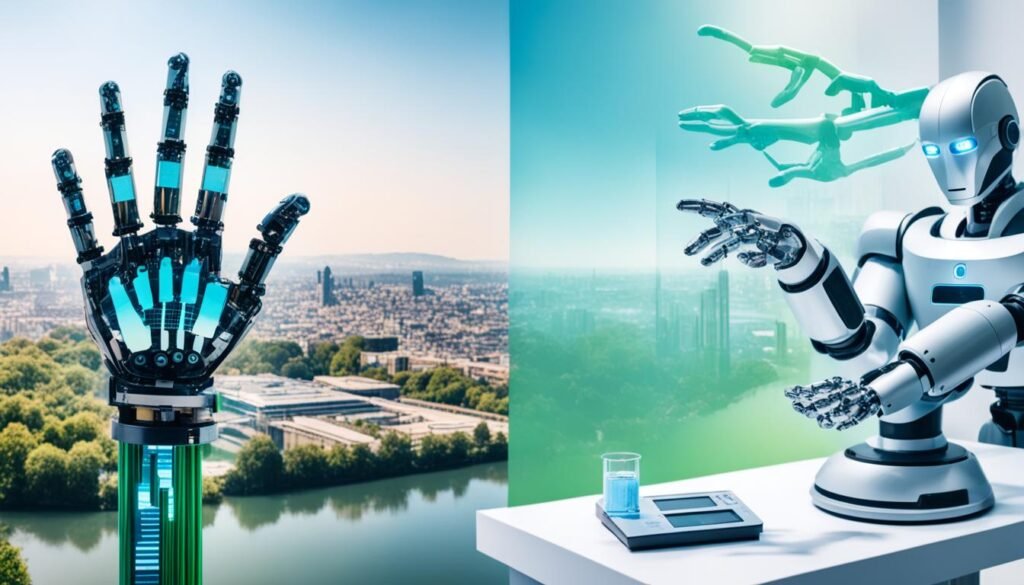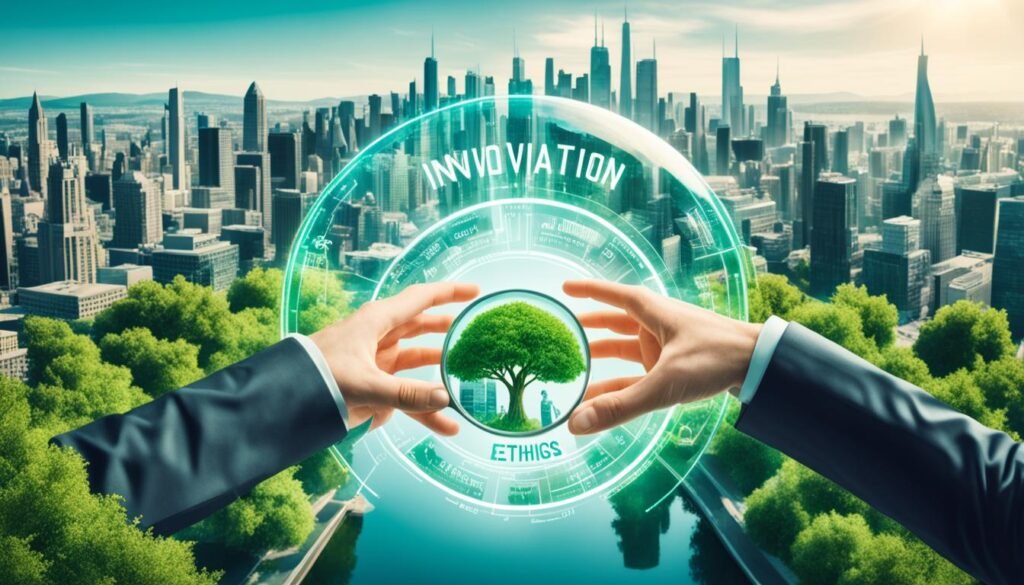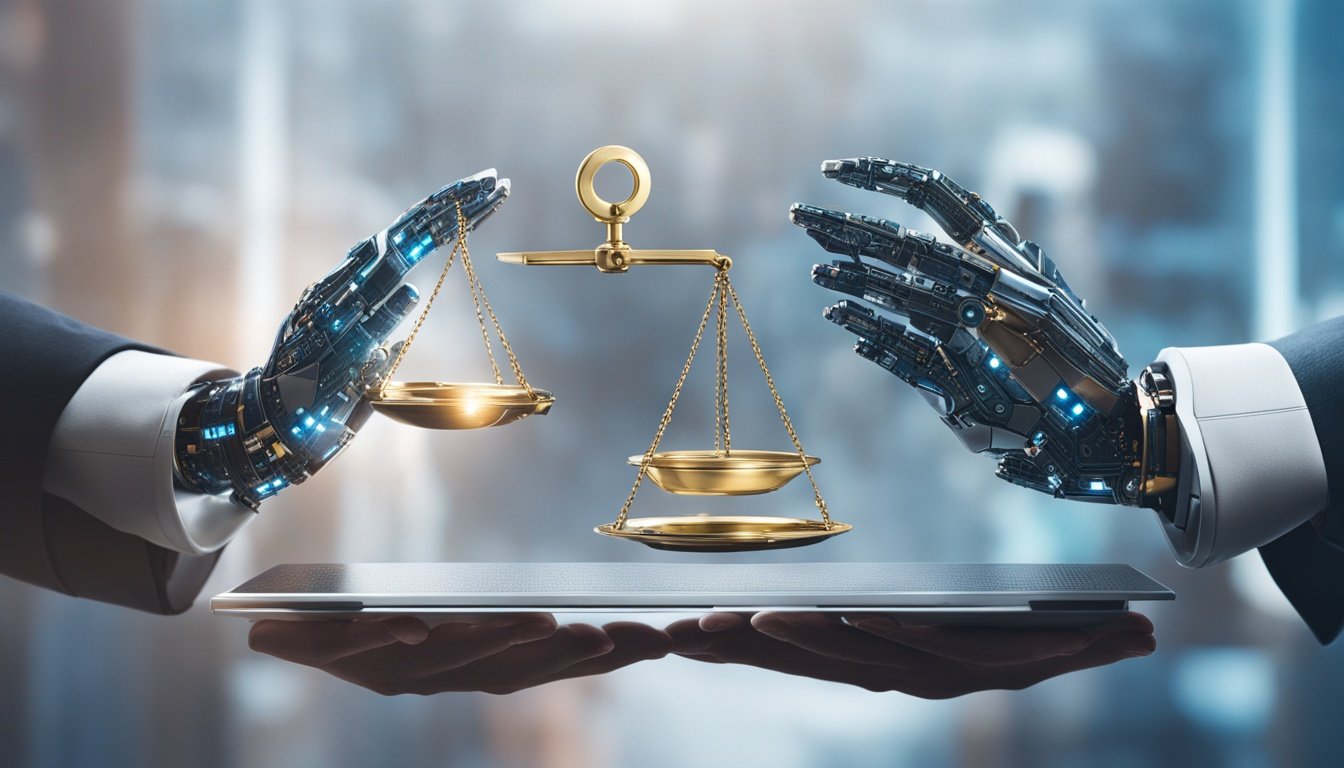In 2016, the National Science and Technology Council (NSTC) published a report on AI’s future. It highlighted the need for AI ethics in areas like public outreach, regulation, governance, economy, and security. As AI becomes more common in our lives, understanding its ethical sides is crucial.
This article will look into how AI influences ethics. We’ll discuss the main groups shaping AI ethics, the challenges it faces, and ways to make AI more responsible and clear. Knowing how AI affects ethics helps us move forward in this changing world. It ensures AI matches our values and benefits everyone.
Key Takeaways
- AI is having a big effect on ethics, making us worry about bias, privacy, and the need for rules and accountability.
- Groups like policymakers, researchers, tech companies, and the public are all working on making AI ethics better.
- AI’s big challenges include bias, discrimination, privacy issues, and the environmental harm from its energy use.
- To make AI more ethical, we need rules, more openness, and teaching the public and leaders about AI.
- It’s important to develop AI responsibly. This way, AI can help people and match our values.
Introduction to AI Ethics
AI technology is getting more advanced and is being used in many industries. This means we need to think about its ethical side. AI ethics are the rules and principles for making and using AI systems responsibly and fairly.
What are AI Ethics?
AI ethics deal with important issues like bias in algorithms, privacy, and how AI affects society. These rules help make sure AI is designed and used in a way that respects human values. They help make AI work for the good of everyone.
Groups like academics, governments, and companies are working on AI ethics. They create rules and standards to make sure AI is used ethically. This includes AI ethics, ethics of artificial intelligence, and ethics of technology.
These groups aim to use AI’s power while avoiding its risks. They want to make sure AI is trusted and benefits everyone fairly.
“The rapid advancement of AI technology has brought forth a pressing need to consider its ethical implications. As we continue to integrate AI into various aspects of our lives, it is crucial that we do so in a way that respects human values and promotes the greater good.”
The Rising Importance of AI Ethics
AI is becoming more common, making it vital to have strong ethical rules. AI can greatly affect people, groups, and society. Without ethics, AI could spread biases, invade privacy, and harm the environment. It’s key to make and use ethical AI practices to enjoy its benefits while avoiding harm.
The idea of AI ethics goes back to thinking about the morals of machines and robots. But, people started paying more attention in the 2010s because of car accidents and data breaches. This made companies like Google, Microsoft, and Meta set up AI ethics boards and rules.
The importance of AI ethics grows as more businesses use AI. Now, 63% of companies are using AI, showing it’s widespread in many fields (Asaro, 2001). This means we must make sure AI is developed and used responsibly.
Adding ethics to AI plans helps businesses in many ways. It builds trust, follows the law, and prevents harm. By focusing on ethical AI, companies can stand out, gain loyal customers, and make more money (OpenAI, 2022).
To make ethical AI, companies should think about fairness, transparency, privacy, accountability, and respect for human rights when making AI. This means fixing bias, being open about decisions, and setting clear responsibilities (Wallach and Allen, 2009).
The need for AI governance is getting bigger. Businesses must keep up and be proactive in using responsible AI practices. This helps them avoid risks and be leaders in ethical AI use.

Stakeholders in AI Ethics
Creating ethical AI rules needs teamwork among different groups. Academics, government agencies, non-profits, and companies all help shape AI ethics.
Key Players Shaping AI Ethics
Researchers and professors lay the groundwork for ethical AI frameworks. Governments and international groups make AI ethics policies and rules. Non-profits push for diverse views and ethical actions. Companies also set their own rules for using AI in their work.
A recent study found only 1.8% of AI research in healthcare talks about its ethical sides. This shows a big gap between high-level ethics ideas and how to use them in real life. Governments and companies have made guidelines for AI development. These focus on making AI safe, fair, and trustworthy by using bioethical principles.
It’s hard to turn AI ethics talks into real-world actions, especially in making ethical AI. Most AI studies in healthcare look at how people see and use AI, not ethics. This study tries to fill the gap between AI ethics ideas and how AI is used in healthcare.
This study is part of the Swiss National Research Program “EXPLaiN.” It looks at the ethical and legal sides of mobile health data. It aims to understand the real ethical challenges in making AI for healthcare. By working together, the research hopes to give insights for better AI ethics governance and responsible AI tech development.
Why AI Ethics Matter
As AI gets more advanced, its effect on ethics and society is growing. Why AI ethics matter is a big question. It shows how AI can deeply affect us all.
AI aims to make or replace human thinking. Its effects can be big on people, groups, and the planet. Bad AI can spread biases, invade privacy, and harm the environment. For example, an AI system missed 82% of Black patients needing follow-up care, even though they made up 46% of the sickest patients.
Adding ethical rules to AI creation and use is key. This ensures AI brings benefits without causing harm. The importance of ethical AI is huge. It helps avoid business risks, follow the law, and keep a good brand image.
The societal impact of AI is huge. In the US, cities are setting rules for AI use, especially in law enforcement. The European Union is also making laws about AI to address ethical issues.
Why AI ethics matter is a complex question. AI ethics are vital for making this powerful tech responsible. This way, it helps everyone, from individuals to society.

“AI ethics is crucial for individuals across various industries as AI becomes more prevalent in daily lives and work environments.”
Ethical Challenges of AI
AI Bias and Discrimination
AI faces a big challenge with bias and discrimination. If AI systems learn from biased data, they can unfairly treat certain groups or people. For instance, Amazon’s AI tool was biased against women, and AI in lending can unfairly target marginalized consumers.
AI can make social inequalities worse, especially between rich and poor countries. It can also take jobs, making economic gaps bigger. Plus, AI in justice systems worries people about bias and unfair treatment.
Many AI systems are hard to understand, making it tough to see why they make decisions. This lack of transparency can hurt trust and make fixing biases hard.
| Challenge | Impact |
|---|---|
| AI Bias and Discrimination |
|
| Lack of Transparency and Accountability |
|
| Job Displacement and Economic Inequality |
|
To tackle AI’s ethical issues, we need a strong plan. This includes good rules, ethical standards, and teaching AI experts, policymakers, and everyone about AI’s risks and benefits.
AI and Privacy Concerns
As AI becomes more common, a big issue is how it affects our privacy. Many AI systems use a lot of data, often without asking us first. This makes us wonder if AI is using our personal info in a good way.
The more AI collects and looks at our data, the more we worry about data privacy. Making sure AI respects our privacy is key to ethical AI. Laws like the GDPR in Europe and the AI Bill of Rights in the US try to help with this.
But, AI is changing fast, especially with generative AI. These AI models can learn from data that has our names and other personal info. This could lead to privacy problems. Also, making these AI tools easy to use could mean sharing things we shouldn’t.
To fix these AI privacy issues, experts and leaders are talking about new rules and safety measures. They want to make sure AI is clear, responsible, and respects our rights. This includes how it uses and keeps our personal data.
| Regulation | Focus |
|---|---|
| General Data Protection Regulation (GDPR) | Aims to provide explanations for decisions made by AI systems, such as loan rejections, to affected individuals. |
| EU AI Act | Aims to regulate AI development and deployment, including provisions for ethical AI and data privacy. |
| AI Bill of Rights (US) | Outlines people’s rights concerning AI, though these are voluntary recommendations. |
As AI keeps getting better, we need to find a way to keep up with privacy. We need strong rules, clear AI making, and working together to make sure AI helps us without taking away our privacy. This way, we can enjoy AI’s benefits while keeping our rights safe.
Environmental Impact of AI
AI is becoming more popular, and its effect on the environment is a big worry. Training the latest AI models needs a lot of energy and causes a lot of carbon emissions. Since 2012, the power needed for AI training has doubled every 3.4 months. This has led to a big increase in energy use.
The tech industry, which includes AI, is expected to make up 14% of all global emissions by 2040. Just one AI training session can create as much carbon dioxide as 300 flights from New York to San Francisco. This shows we need to think about the environmental impact of AI and sustainability and AI now.
Also, the more AI we use, the more electronic waste (e-waste) we make. The World Economic Forum says we’ll have over 120 million metric tonnes of e-waste by 2050. We need AI makers to be open about how their tech affects the environment.
To lessen AI’s harm to the planet, we need a plan. We should make AI systems use less energy, use renewable energy for AI, and follow sustainable AI practices. By acting now, we can make a better future for tech and our planet.
| Metric | Impact |
|---|---|
| Computing power for AI training | Doubles every 3.4 months since 2012 |
| ICT industry emissions by 2040 | 14% of global emissions |
| Carbon emissions from a single AI training session | 626,000 pounds, equivalent to 300 round-trip flights between New York and San Francisco |
| E-waste generation by 2050 | Over 120 million metric tonnes |
“As the adoption of artificial intelligence (AI) continues to grow, the environmental impact of these technologies has become a critical ethical consideration.”
how does ai affect ethics
AI systems are getting smarter and more common in our lives. They’re changing ethics in big ways. These changes affect people, groups, and society.
One big worry is bias. AI can make old biases worse, leading to unfair results for people. This happens because algorithms work with data that might not be fully clear or fair.
AI also worries us because of privacy issues. Ethical implications of ai include threats to our personal info. This makes us think hard about sharing data and who should watch over it.
AI’s effects go beyond just people and privacy. They also touch the environment. AI can harm the planet, making us question its long-term effects.
We need to tackle these ethical issues to make sure AI helps us without hurting us. We must work together. This includes policymakers, AI makers, and the public. We need rules, education, and clear guidelines for AI.
“By the end of 2024, it is anticipated that AI will have proven to be ‘the most transformative technology ever.'”
As AI keeps getting better, we must stay alert and act fast to deal with its ethical sides. This way, we can use AI to make a better future for everyone.

Creating More Ethical AI
As AI becomes more common in our lives, making it ethical and responsible is key. We need to work on many fronts. This includes setting rules and teaching people to use AI in a good way.
Regulatory Frameworks and Education
Now, governments and groups like them are making rules for ethical AI. These rules help stop AI from being biased, invading privacy, and causing other ethical problems. It’s also vital to teach people, AI makers, and others about AI ethics. This helps build a culture of responsible ai use.
- Groups are making rules to help with ethical ai development and stop bad AI use.
- AI ethics education teaches developers, lawmakers, and everyone else how to spot and fix ethical issues.
- It’s important to keep checking AI systems to make sure they follow ai ethics regulations and don’t have risks.
By using rules and teaching, we can make sure AI is good for people and follows ethical rules.
“The ethical development of AI is not just a moral imperative, but a strategic necessity for businesses and governments to maintain public trust and ensure the long-term, sustainable success of this transformative technology.”
AI Ethics in Practice
Implementing ai ethics in practice involves many steps. Companies create their own rules, and governments make laws. Big names like IBM, Google, and Meta have special teams for AI ethics. The United Nations and the World Bank also work on global AI ethics agreements.
These actions set standards for the whole industry. For example, the Asilomar AI Principles, Google’s AI Principles, and the OECD AI Principles are followed by over 40 countries. They aim to tackle AI ethics issues.
The European Union’s GDPR and the California Consumer Privacy Act (CCPA) protect user data in AI. Companies should release AI software carefully and share detailed performance info. This ensures AI works well for everyone.
In the U.S., there’s no federal AI laws yet. Instead, states make their own rules. As AI grows, examples of ethical ai and case studies in ethical ai will guide us. They’ll help shape AI’s future.

“The future of artificial intelligence is not just about technological progress, but about preserving our humanity and ensuring that this powerful technology benefits everyone, not just a select few.”
Conclusion
Artificial intelligence (AI) is changing the world, and we must think about its ethics. This look into AI ethics shows us the main players, problems, and steps being taken. We see issues like bias, privacy, and how AI affects the environment. We also see the need for strong rules and working together.
For AI to fit well in our world, we must tackle these ethical issues. We need to be open, responsible, and understand how AI changes society. This means talking, researching, and working together to set ethical rules and ways to govern AI.
As AI keeps changing, remember these key takeaways: ethics matter, we need to work together, and we must put people first. By following these ideas, we can use AI’s power to make our lives better and protect our future.
FAQ
What are AI ethics?
AI ethics are the rules and values guiding the use of AI technology. They ensure AI is developed and used responsibly and fairly. These rules tackle issues like bias, privacy, and how AI affects society.
Why are AI ethics important?
AI ethics matter because AI can change how we live and work. As AI gets smarter, it can greatly affect people, groups, and society. Without ethics, AI could worsen biases, invade privacy, and harm the environment.
What are the key ethical challenges of AI?
The big ethical issues with AI include bias, privacy worries, and its effect on the environment. It’s vital to tackle these problems to make AI fair and open.
Who are the key stakeholders shaping AI ethics?
Many groups are shaping AI ethics. This includes experts, government agencies, international groups, non-profits, and companies. They all work to make sure AI is used ethically.
How can we create more ethical AI?
To make AI more ethical, we need a broad approach. This includes laws and teaching people about AI ethics. Governments and international groups are setting rules, and educating everyone on why AI ethics matter.
What are some examples of AI ethics in practice?
Companies are setting up teams to deal with AI ethics issues. International groups are also working to spread awareness and create global AI ethics standards. These efforts help make AI development and use responsible.
